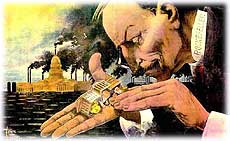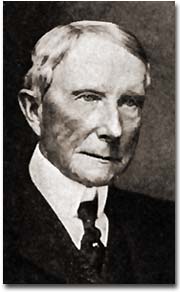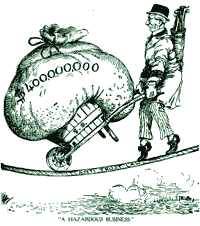Documents and Questions
The House Divided Speech (June 16,
1858) Word Cloud
Background: Lincoln gave this speech in Springfield,
Illinois, at the close of the Republican State convention which named him as
the Republican candidate for U. S. Senator. Senator Douglas, a Democrat, was
not present. This was before the Civil War, when both men were running for the
U.S. Senate. Lincoln lost to Douglas.
Excerpt: “…A
house divided against itself cannot stand. I believe this government cannot
endure permanently half slave and half free. I do not expect the Union to be
dissolved--I
do not expect the house to fall--but I do
expect it will cease to be divided. It will become all one thing, or all the
other. Either the opponents of slavery will arrest the further spread of it,
and place it where the public mind shall rest in the belief that it is in the
course of ultimate extinction; or its advocates will push it forward, till it
shall become alike lawful in all the States, old as well as new--North as well
as South….”
What does Lincoln believe will happen to the
division of the U.S. into slave and free states? Lincoln made this speech two years before the Civil
War began. What does this speech tell you about Lincoln’s intentions for going
to war?
_______________________________________________________________________________________________________________________________________________________________________________________________________________________________________________________________________________________________________
Lincoln’s
First Inaugural Address (March 4, 1861) Word Cloud
Background:
Abraham Lincoln won 40% of the popular vote in 1860 and almost 60% of the
electoral vote. However, his name was not even on the ballot in some Southern
states, and he received almost no votes from the south. Lincoln’s election was
due, in part, to the fact that the opposition split their support between three
different candidates. He made this speech after he was sworn in as president.
Some of the southern states had already seceded from the Union.
Excerpt:
“…I have no purpose, directly or
indirectly, to interfere with the institution of slavery in the States where it
exists. I believe I have no lawful right to do so, and I have no inclination to
do so. . . . In your hands, my dissatisfied fellow countrymen, and not in mine,
is the momentous issue of civil war. The government will not assail you. You
can have no conflict without being yourselves the aggressors. You have no oath … to destroy the government, while I shall
have the most solemn one to preserve, protect, and defend it. I am loath to close. We are not enemies, but friends. We must
not be enemies. Though passion may have strained,
it must not break our bonds of affection. The mystic chords of
memory, stretching from every battle-field, and patriot grave, to every living
heart and hearth-stone, all over this broad land, will yet swell the chorus of
the Union, when again touched, as surely they will be, by the better angels of
our nature.”
What is Lincoln’s oath? ________________________________________________________________________________________________________________________________________________________________________________
Why does he say that the seceded states have no
oath?
________________________________________________________________________________________________________________________________________________________________________________
What does this
speech tell you about Lincoln’s reasons for going to war?
____________________________________________________________________________________________________________________________________________________________________________________________________________________________________________
Emancipation
Proclamation (January 1, 1863) Word Cloud
Background:
After two years of war, Lincoln decided to free the slaves in the Confederacy
(but not those in Union states). On September 22, 1862, he issued the first
version of this proclamation [announcement] which said that the final document
would take effect January 1, 1863.
Excerpt:
“…
all persons held as slaves within any State or designated
part of a State, the people whereof shall then be in rebellion against the
United States, shall be then, thence forward, and forever free; and
the Executive Government of the United States, including the military and naval
authority thereof, will recognize and maintain the freedom of such persons, and
will do no act or acts to repress such persons, or any of them, in any efforts
they may make for their actual freedom…
And
I further declare and make known, that such persons of suitable condition, will
be received into the armed service of the United States to garrison forts, positions, stations,
and other places, and to man vessels of all sorts in said service...”
Who are the “persons” that Lincoln is referring
to and where do they live?
___________________________________________________________________________________________________________________________________________________________________________________________________
How will this proclamation affect the Union
military?
___________________________________________________________________________________________________________________________________________________________________________________________________
What does this
speech tell you about Lincoln’s reasons for fighting the war?
____________________________________________________________________________________________________________________________________________________________________________________________________________________________________________________________________
The Gettysburg Address
(November 19, 1863) Word Cloud
Background:
Six months after the Union victory in the Battle of Gettysburg, Lincoln gave
this speech as part of a dedication of the Gettysburg cemetery. 23,000 Union
and 28,000 Confederacy soldiers died at the battle of Gettysburg.
“Four
score and seven years ago our fathers brought forth on this continent, a new
nation, conceived in Liberty, and dedicated to the proposition that all men are
created equal. Now we are engaged in a great civil war, testing whether that
nation, or any nation so conceived and so dedicated, can long endure. We are
met on a great battle-field of that war. We have come to dedicate a portion of
that field, as a final resting place for those who here gave their lives that
that nation might live. It is altogether fitting and proper that we should do
this. But, in a larger sense, we can not dedicate -- we can not consecrate --
we can not hallow – this ground. The brave men, living and dead, who struggled
here, have consecrated it, far above our poor power to add or detract. The
world will little note, nor long remember what we say here, but it can never
forget what they did here. It is for us the living, rather, to be dedicated
here to the unfinished work which they who fought here have thus far so nobly
advanced. It is rather for us to be here
dedicated to the great task remaining before us -- that from these honored dead
we take increased devotion to that cause for which they gave the last full
measure of devotion -- that we here highly resolve that these dead shall not
have died in vain -- that this nation, under God, shall have a new birth of
freedom -- and that government of the people, by the people, for the people,
shall not perish from the earth.”
What was the unfinished task?
_________________________________________________________________
How did Lincoln think people could honor those
who died?
__________________________________________________________________________________________________________________________________
What does “a new birth of freedom” mean?
_________________________________________________________________
_________________________________________________________________
Why did Lincoln think the people of the Union
should continue fighting the war?
__________________________________________________________________________________________________________________________________
What does this
speech tell you about Lincoln’s reasons for fighting the war?
____________________________________________________________________________________________________________________________________________________________________________________________________________________________________________________________________
Lincoln’s Second Inaugural
Address (March 4, 1865)
Background:
After four years of bloody war, the Union re-elected Lincoln. The defeat of the
Confederacy was near, and many slaves were now free. In his Second Inaugural
Address, Lincoln argued for reunification and rebuilding the South.
Excerpt:
“ …One-eighth
of the whole population were colored slaves, not distributed generally over the
Union, but localized in the southern part of it. These
slaves constituted a peculiar and powerful interest. All knew that this
interest was somehow the cause of the war. To
strengthen, perpetuate, and extend this interest was the object for which the
insurgents would rend the Union even by war, while the Government claimed no
right to do more than to restrict the territorial enlargement of it. Neither
party expected for the war the magnitude or the duration which it has already
attained. Neither anticipated that the cause of
the conflict might cease with or even before the conflict itself should cease…”
What is the peculiar and powerful interest and
what did it have to do with the start of the war?
_________________________________________________________________
__________________________________________________________________________________________________________________________________
Lincoln is saying that at the beginning of the
war, the Union and the Confederacy did not think that slavery would ___________________
before the war was over.
What does this
speech tell you about Lincoln’s reasons for going to war?
____________________________________________________________________________________________________________________________________________________________________________________________________________________________________________________________________
Assignment
Should be at least one typed Page! Follow instructions below carefully!
Making an Interpretation: How did Lincoln’s reasons for fighting
change
over
time?
Directions: You have been considering
the question, “Why did Lincoln fight?” as you analyzed excerpts from five of
his speeches. You have seen that he did not always state the same reason or
reasons for fighting the war, but that his reasons changed over time (that is,
as time went on, Lincoln stated different reasons.) Now that you have evidence
from five speeches in order, spread out over the length of the war, the focus
question changes to: “How did Lincoln’s reasons for fighting the war change
over time?” When historians interpret change over time,
they
look at what was said in the beginning, when and how it changed, and what was
said at the end. In order to answer this question, you have to make an
interpretation. An interpretation
is an educated opinion, your opinion based on the evidence (from the speeches.)
There is no one right interpretation, but an interpretation is wrong if the
evidence does not support it, or if some evidence contradicts it.
Like a main idea or thesis, an interpretation is a general statement only one
or two sentences long.
Here
are three “interpretation starters.” Select one starter that best fits your
interpretation, and fill in the blanks. Then write your interpretation with
evidence in the space below. Quote
from speeches and summarize Lincoln’s ideas when necessary. (Use each of the 5 speeches to prove
your interpretation!)
1. In
the beginning, Lincoln argued that the reason for fighting was _____, but by
the end of the war, his reason(s) had changed to _____.
2. In
all of his speeches, Lincoln had the same reason(s) for fighting the war, which
was _____.
3. In
the beginning, Lincoln argued that the reason for fighting was _____, but by
the end of the war, he added a reason(s), which was (were) _____.
How did
Lincoln’s reasons for fighting change over time?
Type at least one page using specific quotes and evidence from the speeches (follow the directions above carefully)














